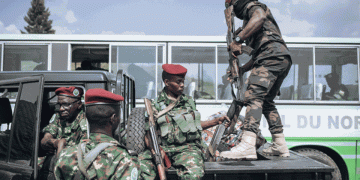The troops will be deployed as part of the regional force set up by the East African Community (EAC) countries to try to stem the advance of the M23 rebellion and disband the hundred or so armed groups that plague eastern DR Congo.
The seven-nation EAC deployed troops late last year in the region.
The fighting in North Kivu province has displaced huge numbers of people and exacerbated tensions, with the DRC government accusing Rwanda of backing the M23 — claims denied by Kigali but supported by the US and several Western nations.
The militia re-emerged from dormancy in late 2021, subsequently occupying swathes of territory in North Kivu, including much of the region north of its capital Goma.
The EAC, which has held several meetings to defuse the crisis and called for the withdrawal of the M23 from occupied areas, created a regional force aimed at stabilising the eastern DRC.
An EAC press statement on Friday confirmed Burundian troops would be deployed, but did not elaborate on the number of soldiers travelling to the DRC.
According to a new timetable adopted by East African leaders last month, “all armed groups”, including the M23, must withdraw by March 30.
At the airport on Sunday, General Emmanuel Kaputa Kasenga, deputy commander of the East African contingent, met the Burundian arrivals and spoke of their mission.
He told the soldiers that they would “participate in the unconditional withdrawal of the M23 rebellion”.
The Burundian troops will join forces with a Kenyan army contingent of about 1,000 men deployed in and around Goma since November.
On Saturday, French President Emmanuel Macron, visiting DR Congo on the last leg of an African tour, said all sides would support a ceasefire in the fighting.
During talks with Angolan President Joao Lourenco and DRC President Felix Tshisekedi, as well as Rwandan President Paul Kagame, Macron said all had “given clear support” to a ceasefire next Tuesday, as envisaged in the timeline mediated by Angola.
By AFP









